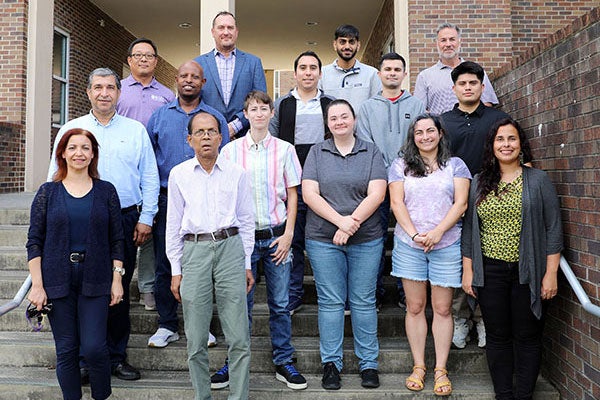ECU receives $650,000 grant to help companies with pollution prevention
The East Carolina University Center for Sustainable Energy and Environmental Engineering (CSE3) has received a grant from the Environmental Protection Agency to enhance sustainability and prevent pollution in North Carolina manufacturing facilities.

Members of the Center for Sustainable Energy and Environmental Engineering team stand for a photograph. The center just received a pollution prevention grant from the Environmental Protection Agency. (Photo by Ken Buday)
The $652,664 grant will allow the center to provide technical assistance to businesses in and adjacent to communities with environmental justice concerns, according to the EPA.
“The result will be reduced usage of hazardous substances and release of pollutants and contaminants, especially by manufacturers in underserved communities; reduced chemical and CO2 emissions and water used in manufacturing; and increased cost savings at industrial facilities,” said Dr. Tarek Abdel-Salam, the center’s director and associate dean for research in the College of Engineering and Technology.
While the project aims to prevent pollution at the source, thus benefiting nearby communities, it will also benefit the businesses, Abdel-Salam said.
“It will reduce costs by supporting the optimum use of materials and machinery, leading to savings from waste reduction,” he said.
The center will work with N.C. State’s Clean Energy Technology Center to conduct eight on-site energy assessments specifically targeting a facility’s major energy consumption units. The goal is to offer no- or low-cost improvements for increased efficiency, Abdel-Salam said.
Other activities associated with the grant include:
- 14 general on-site energy, water, greenhouse gas inventory and lean assessments with recommendations on how each facility can prevent pollution, reduce water and energy consumption, reduce greenhouse gases, and improve productivity;
- Eight regional pollution prevention and lean-related training courses for industries throughout North Carolina;
- Eight on-site training sessions designed for facility managers and engineers to access opportunities in their organizations to reduce consumption and optimize systems for emission reduction and cost savings;
- Four regional workshops that focus on pollution prevention in manufacturing;
- Eight pollution prevention webinars;
- CSE3 website posts of workshop materials, training manuals, assessment recommendations and other reports for general viewing.
ECU faculty from engineering, construction management, technology systems, economics and marketing as well as staff from the ECU Office of Innovation and Engagement will support the project. Six undergraduate students and two graduate students will also be part of the team, giving them experiential learning that will be helpful in their careers upon graduation, Abdel-Salam said.
He said the overall goal is to prevent pollution and reduce health risks, especially for those in disadvantaged areas.
“This pollution prevention approach will address environmental and health concerns by reducing waste of water, hazardous or toxic chemicals and products, and energy,” Abdel-Salam said. “Our ability to offer technical assistance and guidance on regulatory compliance to facilities in disadvantaged communities will help ensure that these facilities do not disproportionately burden these communities with harmful pollution.”